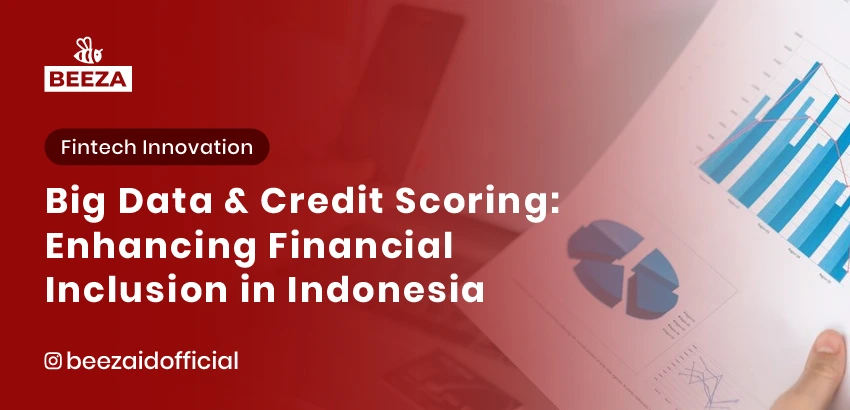
Financial inclusion remains a significant challenge in Indonesia, with nearly 50% of the population lacking access to banking services or loans. Many individuals and small businesses in Indonesia do not have a credit history that can be evaluated by traditional financial institutions. However, advancements in Big Data technology and credit scoring systems offer a solution to expand access to financial services for those previously excluded. This article will discuss how Big Data and modern credit scoring systems can enhance financial inclusion in Indonesia, as well as the benefits that both individuals and financial institutions can gain from utilizing these technologies.
Why Does Financial Inclusion Matters?
Financial inclusion is a critical factor in accelerating economic growth in Indonesia, as many individuals lack access to financial services, which limits their ability to obtain loans for education, healthcare, or business ventures.According to data from the OJK, over 150 million Indonesians remain disconnected from formal financial services. However, with the increasing use of technology and data, there is now an opportunity to reach those previously unreachable by traditional banking systems.
The Role of Big Data in Credit Scoring
Conventional credit scoring systems depend on existing credit history data. However, many individuals, particularly those who are recent to the workforce or in the process of establishing their business, lack such data. In such cases, Big Data plays a crucial role. This technology enables financial institutions to gather data from various alternative sources to assess an individual’s creditworthiness.
Examples of alternative data sources include:
- E-commerce transactions: Information regarding online shopping history and bill payments.
- Mobile payment application data: This includes phone bill payments and transportation fees.
- Digital footprint: Social media activity and other digital platforms reflecting an individual’s financial stability.
By using this data, financial institutions can develop more comprehensive and accurate credit profiles, offering a fairer assessment for individuals without conventional credit records.
Challenges in Enhancing Financial Inclusion
Despite the significant potential of Big Data, there are several challenges to maximizing its role in enhancing financial inclusion in Indonesia. The primary challenges are as follows:
- Limited Digital Infrastructure: Not all regions in Indonesia have sufficient internet access or the digital devices necessary to utilize Big Data.
- Data Security: Collecting and processing personal data requires serious attention to privacy and data protection issues. Government and relevant authorities must ensure that data is used safely and in compliance with regulations.
- Low Digital Literacy: While internet penetration is increasing, many people still lack understanding of how to use digital services, which may hinder the adoption of these technologies.
Solutions to Overcome Challenges
In order to overcome the current challenges, it is essential that the government, private sector, and financial institutions collaborate.The following steps can be taken to address these issues:
- Improving Infrastructure: The government should collaborate with telecommunications providers to expand internet coverage in underserved areas and support the development of digital infrastructure.
- Enhancing Data Security: Strengthening personal data protection regulations to ensure that data used in credit assessments is managed securely and in accordance with applicable laws.
- Public Education: Conducting awareness campaigns to improve public understanding of the benefits and use of digital technologies in accessing financial services.
Case Study: Using Big Data for Credit Scoring in Indonesia
To provide a clearer picture of how Big Data and credit scoring can be used to enhance financial inclusion, here is a case study from a fintech company operating in Indonesia.
Problem:
A significant number of individuals in Indonesia, particularly in rural areas and regions with limited bank access, lack a credit history or encounter challenges in obtaining loans due to their absence from traditional financial systems.
Solution:
This fintech company uses Big Data to examine diverse alternative data from its users, including utility payment transactions, online shopping purchases, and mobile payment app usage history. By combining this data, the company can create more comprehensive credit profiles and offer fairer credit assessments.
Result:
The result of this initiative has been positive, with many users now having access to loan services. Consequently, numerous users who were previously unreachable due to their limited access to loan services can now secure micro-loans at reduced interest rates. The company has also been able to provide more affordable financial services to individuals in areas that were previously difficult to reach by traditional financial institutions.
Another Case Study:
A major financial institution in Indonesia has also initiated the implementation of Big Data in its credit scoring system. The institution gathers data from various sources, including mobile banking usage and spending patterns on digital platforms, to assess an individual’s creditworthiness. This strategic initiative enables the institution to offer loans to a broader demographic, including those without a traditional credit history.
Key Points Summary
- Big Data has the potential to expand access to financial services by collecting and analyzing alternative data to build more complete credit profiles.
- Big Data-based credit scoring systems empower financial institutions to extend loans to individuals who were previously inaccessible to traditional financial systems.
- The main challenges in enhancing financial inclusion include limited digital infrastructure, data security concerns, and low digital literacy.
- Solutions to these challenges involve collaboration between the government, private sector, and financial institutions, as well as improved infrastructure and public education.
Conclusion
Big Data and alternative data-based credit scoring systems play a vital role in enhancing financial inclusion in Indonesia. These technologies provide an opportunity for individuals who were previously excluded by traditional banking systems to access the financial services they need. While challenges remain, with better infrastructure and appropriate policies, Indonesia can leverage these technologies to create a more inclusive and fair financial system.For more information on how Big Data and credit scoring can enhance financial inclusion in your business, contact us at Beeza and find the right financial technology solution for your needs.